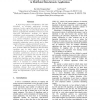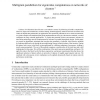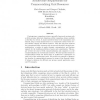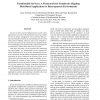HPDC
2002
IEEE
14 years 4 months ago
2002
IEEE
We describe a decentralized, adaptive mechanism for replica location in wide-area distributed systems. Unlike traditional, hierarchical (e.g, DNS) and more recent (e.g., CAN, Chor...
HPDC
2002
IEEE
14 years 4 months ago
2002
IEEE
In high energy physics, bioinformatics, and other disciplines, we encounter applications involving numerous, loosely coupled jobs that both access and generate large data sets. So...
HPDC
2002
IEEE
14 years 4 months ago
2002
IEEE
HPDC
2002
IEEE
14 years 4 months ago
2002
IEEE
We examine the use of Web services, an XML-based distributed object system, for developing reusable, interoperable services for computational science web portals. This paper descr...
HPDC
2002
IEEE
14 years 4 months ago
2002
IEEE
Clusters of workstations have become a cost-effective means of performing scientific computations. However, large network latencies, resource sharing, and heterogeneity found in ...
HPDC
2002
IEEE
14 years 4 months ago
2002
IEEE
While distributed, heterogeneous collections of computers (“Grids”) can in principle be used as a computing platform, in practice the problems of first discovering and then co...
HPDC
2002
IEEE
14 years 4 months ago
2002
IEEE
HPDC
2002
IEEE
14 years 4 months ago
2002
IEEE
HPDC
2002
IEEE
14 years 4 months ago
2002
IEEE
Several recently proposed infrastructures permit client applications to interact with distributed network-accessible services by simply ”plugging in” into a substrate that pro...
HPDC
2002
IEEE
14 years 4 months ago
2002
IEEE
Resource location (or discovery) is a fundamental service for resource-sharing environments: given desired resource attributes, the service returns locations of matching resources....





